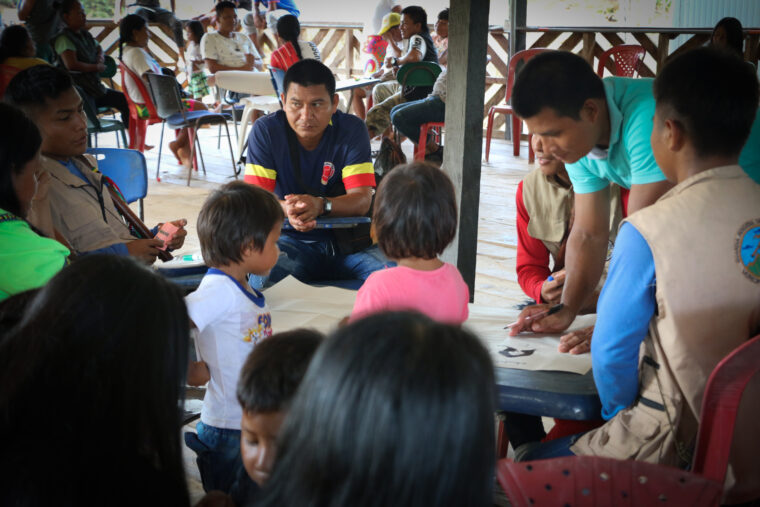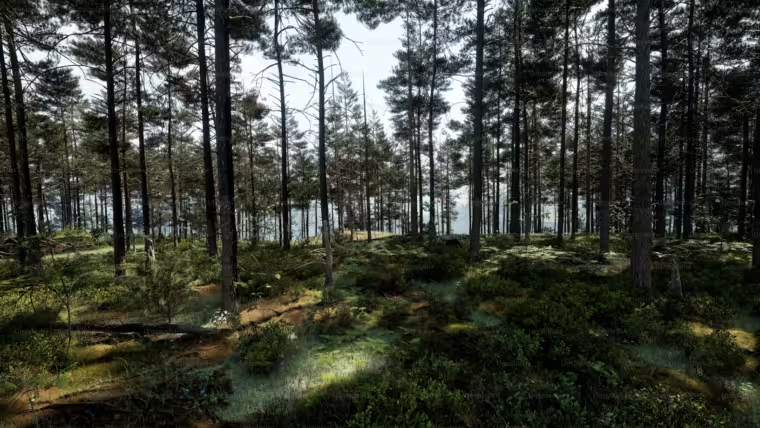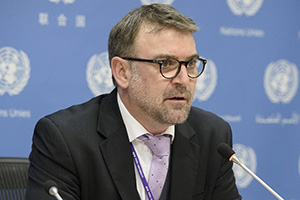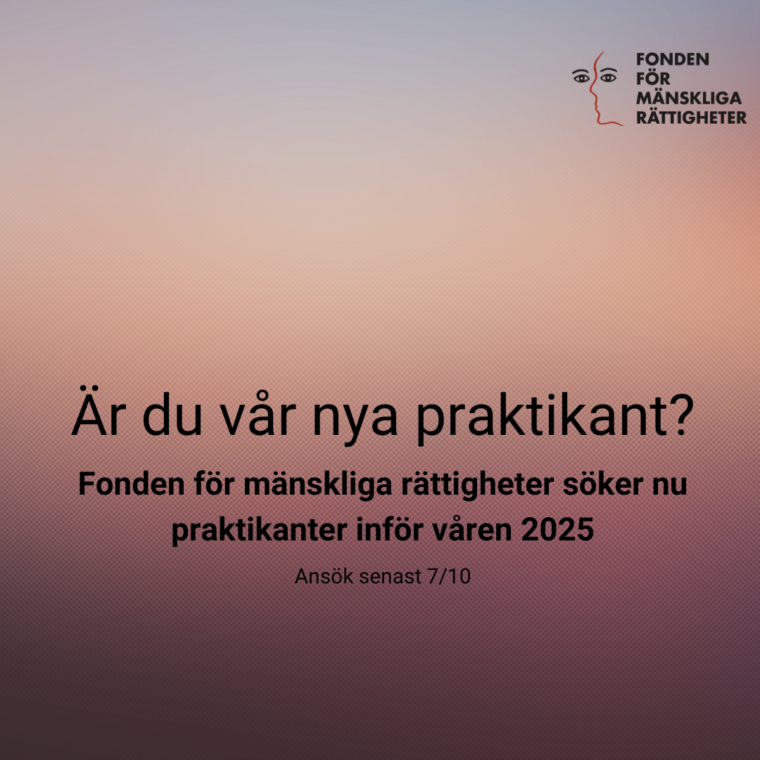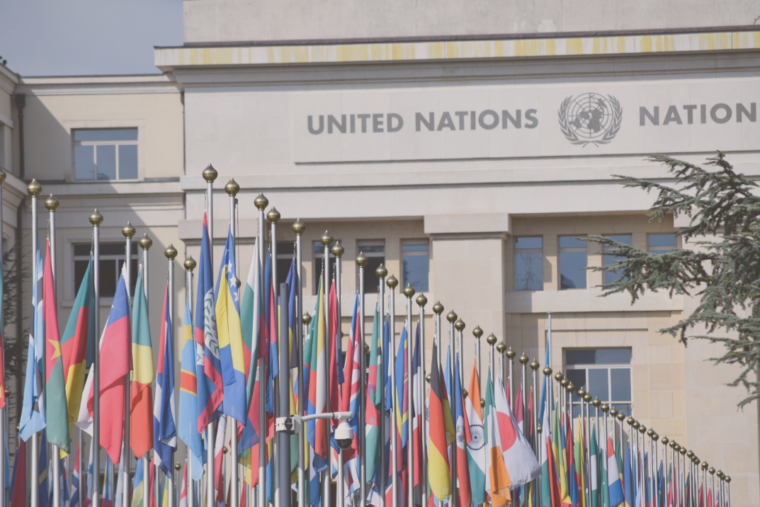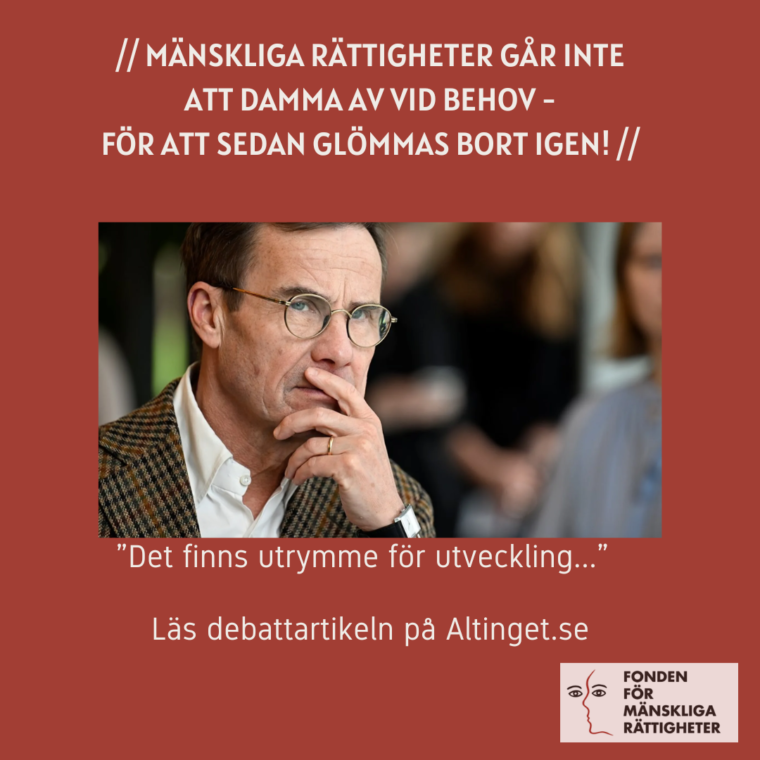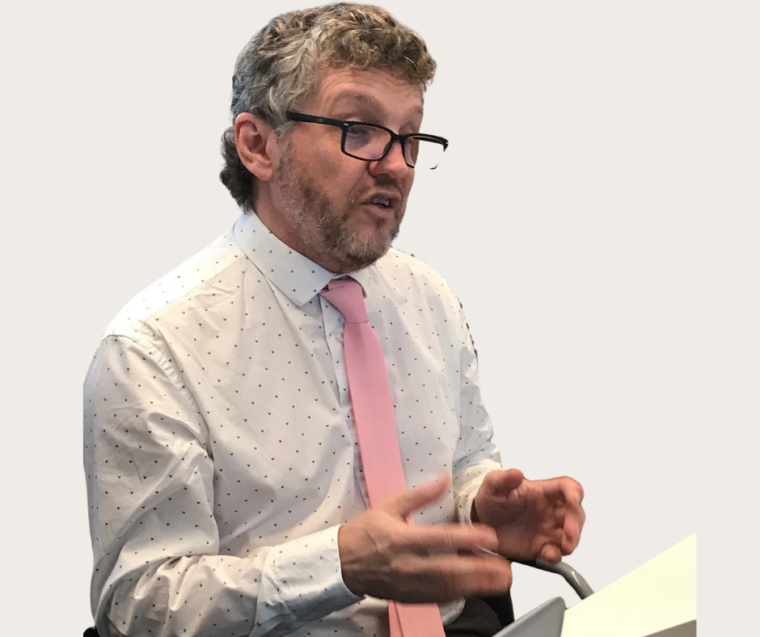
Picture of UN Special Rapporteur on the promotion of truth, justice and reparation, Mr. Fabián Salvioli.
On 22March 2024, the Swedish Foundation for Human rights in collaboration with the Swedish Network for Transitional Justice (SNTJ), organized a digital meeting with UN Special Rapporteur on the promotion of truth, justice and reparation, Mr. Fabián Salvioli. During the meeting Mr. Salvioli shared his experiences from his official country visit to Sweden that took place 18 – 22 of March 2024. The purpose of the country visit was to examine the transitional justice measures adopted by the authorities in Sweden to address the legacy of human rights violations endured by the Sámi indigenous people and the Tornedalian, Kven, and Lantalais minority in the context of assimilation and related policies.
Fabián Salvioli: At the time of the seminar Mr. Fabián Salvioli was the UN Special Rapporteur on truth, justice, reparation and the guarantees of non-recurrence, which he took up 1 May 2018. Mr. Salvioli is a human rights lawyer and professor of International Law and Human Rights at the School of Law of the University of La Plata, where he is also Director of the Human Rights Master Program and Director of the Institute of Human Rights. Mr. Salvioli’s term as mandate holder ended 1 May 2024, and Mr. Bernard Duhaime is the current mandate holder.
Moderator: Ulrika strand, secretary general of the Swedish Foundation for Human Rights.
Notes from the digital meeting
Ulrika Strand opened the meeting by welcoming Mr. Salvioli and the audience. Following the welcoming, Ulrika invited Mr. Salvioli to talk about his impressions from the country visit and to provide his insights to transitional justice in the broader terms.
Mr. Salvioli begun with an introduction to his prior work in the UN system where he served as a member of the UN human rights committee. Shifting focus to the mandate, Mr. Salvioli emphasised that the mandate is complicated. As mandate holder one deals with serious human rights violations, crimes against humanity, disappearances and in some cases genocide. The mandate deals with civil and political rights as well as economic, social, cultural, and environmental rights. The mandate holder’s work with remedies and reparation in the broad term, in addition to monetary compensations, it includes providing psychosocial support, medical care and psychiatric support to the victims, the families and sometimes to the community. The mandate holder also addresses gender-based abuses, which unfortunately are present in many of these types of violations. Additionally, the mandate holder works with institutional reform as a mechanism for non-repetition. This includes changing laws, adopting new laws, initiating processes for those who were involved in serious human rights violations and in some instances constitutional reform. Mr. Salvioli states that the broadness makes the mandate fascinating, however its simultaneously fatal because in very short time and in very short processes the mandate holder needs to deal with an infinitum of quantity of issues. Lastly Mr. Salvioli emphasizes that the key word of the mandate is transition. Transitions can either be a country going from a dictatorship or authoritarian regime to democracy or the exit of an armed conflict.
Mr. Salvioli moves on with telling an anecdote of when he started his work in human rights in the early eighties in Argentina, just after the end of the dictatorship, as an activist for Amnesty International. “For us transitional justice was considered the devil, why? Because the mechanisms of transitional justice in Chile and in other places were to seek the truth but impunity. Truth against justice.” Moving on to explaining that in Argentina they were in favour to prosecute and punish the responsible for the horrible crimes committed. 35 years later Mr. Salvioli is the special rapporteur on transitional justice. But he emphasises that he did not change, transitional justice changed.
The field of transitional justice
Mr. Salvioli proceeds with talking about the filed of transitional justice. The mandate of the special rapporteur on transitional justice, was established by the human rights council of the UN and the resolution clearly states that international human rights law, international humanitarian law and international criminal law are the basis for the job. However, the vast part of the doctrine of transitional justice considered transitional justice as political negotiations. Mr. Salvioli empathizes that this is dangerous from the point of view of the victims. Victims are revictimized when they are put in the position to choose between truth and justice, and victims have the right to both.
The mandate of the Special Rapporteur on the promotion of truth, justice and reparation
Going back to the mandate again Mr. Salvioli states that the mandate concerns the promotion of truth, justice, reparations, and guarantees for non-repetition. Additionally, Mr. Salvioli has had the idea to add memorialisation as the fifth pilar since the mandate has five main issues, truth, justice, reparations, guarantees of non-occurrences and memory. Mr. Salvioli proceeds with discussing how the mandate relates to his country visit to Sweden.
The first pilar of the mandate: truth
Beginning with truth, more specifically seeking the truth trough truth commissions. In Sweden there are two truth commissions, one finished for the Tornedalian, Kven, and Lantalais minority and one ongoing for the Sámi indigenous people, as demanded by the Sámi parliament. The report is expected to be presented at the end of 2025. Mr. Salvioli had interviews with members of the Sámi truth commission and with other stakeholders and his impression is that the time is a bit short for establishing a solid report, which is important because you have one opportunity and the task must be fulfilled in a proper manner. Mr. Salvioli further states that truth commissions have undergone a good evolution, in the past it was just lawyers having interviews with victims. Now it is clear that you need a more interdisciplinary team, and the truth commission must go to the field for receiving testimonies. In that last regard Mr. Salvioli states that the truth and reconciliation commission for the Tornedalian, Kven, and Lantalais was interesting as they developed coffee dialogues in the way of the minority customary practice, emphasizing that that is the way to pursue.
Mr. Salvioli further explains that many governments consider that with the report of a truth commission the work is finished, but actually the report is the beginning because there are recommendations. One of his concerns in this visit is the lack of fulfilment of the recommendations made by the truth commission for the Tornedalian, Kven, and Lantalais. It is not just to deliver the report, we need a mechanism. Mr. Salvioli expressed to the Swedish government that it must establish a long-term mechanism for the implementation, because if not you provoke frustration again – amongst the victims and the families.
The second pilar of the mandate: justice
The second pilar of the mandate is justice, justice is to hold accountable, to prosecute and punish the responsible of serious and heinous crimes committed. That is often really difficult because the army may still be in power or has power even if they left the government or because the party in the government is an ally to the perpetrators or because they don’t want to have problems in the name of the peace and therefore establish pardons or amnesties. Mr. Salvioli states that this is unacceptable, international human rights law is clear and especially after the adoption of the Roman statue of the international criminal court. There is no possibility of amnesties or pardons for these kinds of crimes. Of course, a person could receive benefits for cooperation, for instance for discovering where the remains of disappeared people are. But benefits are not impunity. You can reduce the sentence, but not say you are free, that is totally incompatible with the international standards.
The third pilar of the mandate: reparation
The third pillar is reparation. Reparation is under the concept of full reparation, it is not just compensation, it’s not just measures of satisfaction like an apology, it is not just rehabilitation, it is all, full reparation. Mr. Salvioli recommends the Swedish government to establish a national programme, a holistic national programme, for reparations dedicated to the victims, the families and the communities. Mr. Salvioli explained that it was painful for him to discover that the government never apologized to the Tornedalian, Kven, and Lantalais minority even after the report of the truth commission. With the Sámi people the situation is more or less the same as it was just one ministry, agricultural, that at one time presented an apology. Mr. Salvioli adds that the church presented apologies and economic reparations, which was a good practice of the Church of Sweden.
The fourth pilar of the mandate: guarantee of non-repetition
The fourth pillar is guarantee of non-repetition, which is very broad and includes institutional reforms. In the case of Sweden, Mr. Salvioli states that it was a good initiative to establish the Sámi parliament and to recognise the Sámi as an indigenous people in the constitution. However, in practice he found the power of the Sámi parliament to be very little. Another relevant issue concerns the positions of the Sámi parliament in the national policy, and if it is equivalent to zero it means nothing. In this regard consultation is fundamental. But consultation in the framework of the legal international standard, free, prior, and informed consent. Mr. Salvioli recommended the government to ratify the international labour organisation covenant 169 on indigenous people, which will show the real will of the Swedish government in this regard.
Mr. Salvioli further addresses the fact that there is a problem with the culture and language of both the Sámi people and the Tornedalian, Kven, and Lantalais minority. The language and the culture are at risk as there are not enough professors in Sámi language and in Meänkieli even worse. The government adopted some measures but it’s not enough. Mr. Salvioli also expressed his deep concern about the hate speech and discrimination based in false stereotypes against the Sámi people and the Tornedalian, Kven, and Lantalais minority. The freedom of expression cannot cover hate speech and discrimination. Sweden has ratified the international convention for racial elimination, article 4 is clear in that regard.
The fifth pilar of the mandate: memorization
Mr. Salvioli passes to the fifth pillar memorization. He is studying how the state is addressing the past serious human rights violations committed in the policy of assimilation both by the Swedish state and the church and the legacy of these violations. Mr. Salvioli expressed that in terms of memorialization there is big way to transit. One good policy is that of the museums, to give back to the Sámi population artifacts, objects and human remains. He heard about 12 initiatives in this regard during his visit, but Mr. Fabián Salvioli expressed that it’s still in the process and the government needs to move forward. Finally, Mr. Salvioli stated that there is a problem inside the Sámi community, due to the division between those who are members of a Sámi reindeer herding community and those who are not, such as fisher and hunting non reindeer herding Sámi, which has provoked conflict, also with the Tornedalians over land property, which is a particular issue to address.
Ulrika asks Mr. Salvioli if the government representatives he met gave any response to the comments that Mr. Salvioli gave and what had surprised him most during his visit to Sweden?
Mr. Salvioli had meetings with all areas of the government, with civil society organisations, Sámi civil society, Sámi institutions, representatives of the Tornedalian, Kven, and Lantalais minority and academic researchers. He had 40-45 meetings during the visit and travelled to Kiruna. Regarding the Swedish government Mr. Salvioli expressed that they were very open in terms of providing answers. However, providing answers does not mean that they will follow the recommendations. Additionally to providing answers the government recognised some concerns for instance the hate speech and the issue of suicides in the Sámi population, the lack of implementation of the recommendations of the truth commission for the Tornedalian, Kven, and Lantalais.
In regard to the second question Mr. Salvioli answers that the situation in Sweden was not new to him. Previous to the visit Mr. Salvioli prepared by reading many reports coming from the council of Europe and treaty bodies of the UN as well as reports coming from civil society organisations. Mr. Salvioli also produced a report on the legacy of colonialism, and he was following the situation for indigenous people in the Nordic countries. However, at the same time he was surprised by his visit. The Nordic countries have a good reputation in terms of human rights. The lack of implementation of international recommendations shocked Mr. Salvioli and he expressed this to the government. When Mr. Salvioli was a member of the human rights committee in 2009, the committee expressed concern about this, how is it possible that 17 years later we have the same situation. That is unacceptable for a country which has a good record and reputation in terms of human rights. Mr. Salvioli further states that he decided to come to Sweden also to pass a clear message that transitional justice is not just for the poor countries in the “global South”.
The meeting proceeds with Mr. Salvioli answering questions from the meeting participants. Mr. Salvioli is first asked if he had knowledge of the Tornedalian, Kven, and Lantalais minority prior to his visit. Mr. Salvioli answers that he gained knowledge about the minority when he started to study in preparation for the visit, but never before. That is the difference with the Sámi people. The Sámi are very well known, even in the international community. The Tornedalian, Kven, and Lantalais minority are more invisible on the international arena and also by the Swedish population, which Mr. Salvioli emphasize is a problem.
The next question from the audience concerned the differences between the truth commission in Sweden compared to international truth commissions along with a question concerning land and reparations.
Mr. Salvioli answers that there are differences between the Swedish and other truth commissions. Stating that he is a little bit concerned. A truth commission is a mechanism to seeking the truth and seeking the truth is to discover in a broad manner what happened. That means to identify the past serious human rights violations committed. The truth commission for the Sámi has a very broad mandate, not just about past abuses and the consequences but also with the general situation of Sámi, and that could be a risk. Mr. Salvioli has provided some ideas of how to reconduct the work of the mission in a proper manner. Mr. Salvioli also answers that the best example of a truth commission is the example of Colombia. The method of work of the truth commission was great, and that is a good example to follow.
Moving onto the second part of the question, land rights and territory, that is the main issue but it’s not Mr. Fabián Salvioli’s mandate. The mandate is how do we deal with past abuses, but he did recommend the State to ratify the ILO 169 and to fulfil its obligations of free, prior and informed consent. Mr. Salvioli additionally expresses his concern about the green transition policy, because it is a Trojan horse. Behind the green transition policy you could find ways for violating rights of the indigenous people. Both to the government and at the press conference Mr. Salvioli stated that yes you must balance the two, but one thing is interest and the other is rights. You cannot put interest and rights on the same level. Interests must be considered in the light of the rights.
The last question asked to Mr. Salvioli was about how the pillar of accountability should be understood in relation to these more historically oriented truth commissions, where the issue is not so much whether to hold individual perpetrators accountable, but rather to identify which institutions to hold accountable. For example, the Truth and Reconciliation Commission for Tornedalians, Kvens and Lantalaiset did not only make recommendations to the Swedish government, but also to the Chruch of Sweden and the organisation that funded boarding schools.
Mr. Salvioli expressed that in legal terms when we talk about accountability we are thinking about criminal responsibility and criminal responsibility is just for individuals, but of course in terms of responsibility it is within the mandate of the truth commission to identify institutions and especially because they have a role to play to provide apologies and in any case to provide compensations for the victims.
Read the Preliminary Observations from the visit to Sweden here
The final report will be published in September 2024 and will be available here

